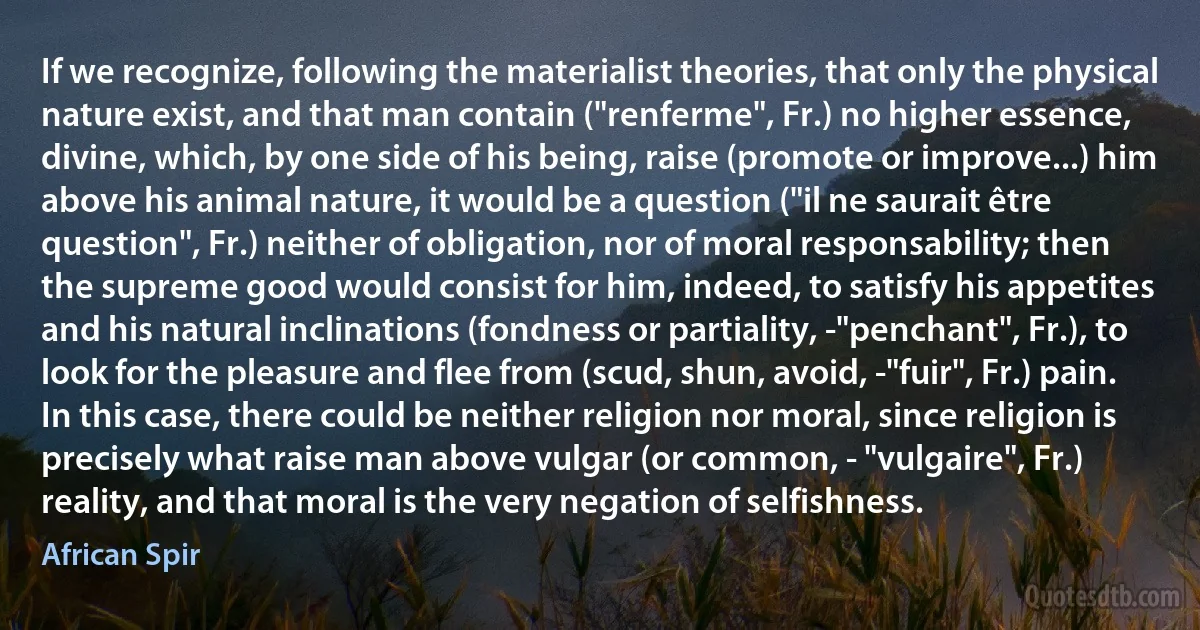
If we recognize, following the materialist theories, that only the physical nature exist, and that man contain ("renferme", Fr.) no higher essence, divine, which, by one side of his being, raise (promote or improve...) him above his animal nature, it would be a question ("il ne saurait être question", Fr.) neither of obligation, nor of moral responsability; then the supreme good would consist for him, indeed, to satisfy his appetites and his natural inclinations (fondness or partiality, -"penchant", Fr.), to look for the pleasure and flee from (scud, shun, avoid, -"fuir", Fr.) pain. In this case, there could be neither religion nor moral, since religion is precisely what raise man above vulgar (or common, - "vulgaire", Fr.) reality, and that moral is the very negation of selfishness.
African SpirRelated topics
above animal case common divine following fondness good man materialist natural nature nor pain penchant pleasure question raise religion selfishness side higherRelated quotes
This morning I received a letter from de Bellio. He writes that he does not believe scientific research into the nature of color and light can help the artist, neither can anatomy nor the laws of optics. He wants to discuss these questions with me and find out my views. Now everything depends on how this knowledge is to be used. But surely it is clear that we could not pursue our studies of light with much assurance if we did not have as a guide the discoveries of Chevreul and other scientists. I would not have distinguished between local color and light if science had not given us the hint; the same holds true for complementary colors, contrasting colors, etc. 'Yes', he will tell me: 'but these have always been taken into account, look at Monet' It is at this point that the question becomes serious!

Camille Pissarro
The immediacy of falling in love recognizes but one immediacy that is ebenburtig (of equal standing), and this is a religious immediacy; falling in love is too virginal to recognize any confidant other than God. But the religious is a new immediacy, has reflection in between-otherwise, paganism would actually be religious and Christianity not. That the religious is a new immediacy every person easily understands who is satisfied with following the honest path of ordinary common sense. And although I imagine I have but few readers, I confess nevertheless that I do imagine my readers to be among these, since I am far from wanting to instruct the admired ones, who make systematic discoveries a la Niels Klim, who have left their good skin in order to put on the "real appearance.”.

Søren Kierkegaard
If you expect manners from modern newspapers you will be sorely disappointed in these democratic days. It is one of the blessings of modern democracy? If you were in America and did not give any interview, even then they would invent one? The press is a public institution; formerly, it was something dignified, but now the newspapers are the correct measure of the futility of human life.... It is the same with all other modern things... the press, the theatre, the radio; they drag down everything to the level of the crowd.... They succeed only if they can pamper the common man's tastes.... It is the same old question of the mass being pulled up by something higher. But, as it always happens, instead of being pulled up it is the mass that pulls everything down to its level....

Sri Aurobindo
On the 15th of April 1744, I described the principle upon which the following work is based, in the public assembly of the Royal Academy of Sciences of Paris, as reported in the Acts of that academy.
At the end of the same year, Professor Euler published his excellent book Methodus inveniendi lineas curvas maximi minimive proprietate gaudentes. In a supplement to his book, this illustrious geometer showed that, in the trajectory of a particle acted on by a central force, the velocity multiplied by the line element of the trajectory is minimized.
This observation gave me great pleasure, as a beautiful application of my principle to the motion of the planets, which is determined by this principle.
From the same principle, I will now try to derive higher and more important truths.

Pierre Louis Maupertuis
There are particular movements in particular epochs in which the Divine Force manifests itself with supreme power shattering all human calculations, making a mock of the prudence of the careful statesman and the scheming politician, falsifying the prognostications of the scientific analyser and advancing with a vehemence and velocity which is obviously the manifestation of a higher than human force. The intellectual man afterwards tries to trace the reasons for the movement and lay bare the forces that made it possible, but at the time he is utterly at fault, his wisdom is falsified at every step and his science serves him not. These are the times when we say God is in the movement, He is its leader and it must fulfil itself however impossible it may be for man to see the means by which it will succeed.

Sri Aurobindo
